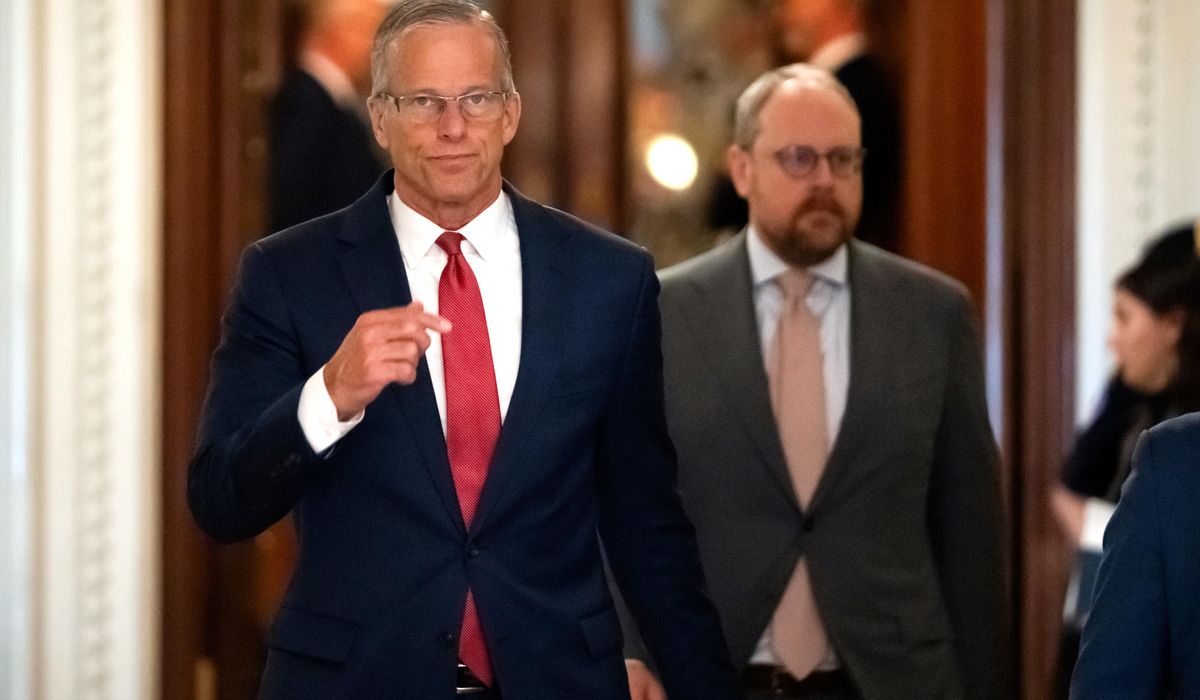


Senate Republicans passed early Thursday a $9 billion package of spending cuts to foreign aid programs and public broadcasting, sending it back to the House for final approval.
The final 51-48 vote came at 2:30 a.m., after the Senate spent 12 hours debating and voting on amendments to the bill. Republican Sens. Susan Collins of Maine and Lisa Murkowski of Alaska joined all Democrats in opposition.
President Trump requested the rescissions package at the beginning of June and Congress has until Friday to send the measure to his desk for signature or the administration will be obligated to spend the money.
The House has scheduled a vote on the Senate-amended package for Thursday night.
The original House-passed rescissions package cut $9.4 billion, as requested by Mr. Trump and the White House Office of Management and Budget. The measure seeks to codify roughly 5% of the $190 billion in government savings identified by the Department of Government Efficiency.
The only amendment the Senate adopted to the bill was GOP substitute text restoring $400 million in funding for the President’s Emergency Plan for AIDS Relief, or PEPFAR. That dropped the total amount of cuts to $9 billion.
“I’m frustrated about it,” Sen. Jim Banks, Indiana Republican, told The Washington Times. “It’s already a drop in the bucket. We’re making it even smaller. But it’s still a $9 billion cut. And my request to the White House is to quickly send us the next one.”
Budget Director Russell Vought has said a successful Senate vote on the first rescissions package would lead to more.
The Senate blocked a $15 billion rescissions package Mr. Trump requested in his first term, so this first rescissions package served as a test for the chamber’s willingness to approve spending cuts in the president’s second term.
The bulk of the spending cuts, $7.9 billion, come from various foreign aid accounts. The remaining $1.1 billion cuts funding for the Corporation for Public Broadcasting, ending taxpayer subsidies for NPR and PBS, which Republicans say they oppose because the outlets have a liberal bias.
“President Trump promised to cut waste, fraud, and abuse within the federal government,” said Sen. Eric Schmitt, the Missouri Republican who led negotiations on the package. “Today, the Senate delivered on this promise by passing the president’s rescissions package, clawing back $9 billion in wasteful spending to end the partisan capture of NPR and PBS, defund radical non-governmental organizations, and halt foreign policy programs dedicated to advancing leftist propaganda instead of American priorities.”
Democrats spent the 12 hours of open amendment debate on the bill offering proposals to protect various foreign aid programs, like UNICEF, and public broadcasters from the cuts.
All Democrats’ amendments were rejected, although Ms. Collins and Ms. Murkwoski joined them in voting for several.
“This is a dark day for America, a dark day for rural Americans, a dark day for any American who relies on public broadcasting during floods, hurricanes, tornadoes, and other disasters,” said Senate Minority Leader Charles E. Schumer, New York Democrat.
“And this is also a dark day for this chamber,” Mr. Schumer said. “Everyone here knows this is not how the Senate should function.”
Democrats have said the Trump administration and congressional Republicans, in pursuing partisan rescissions to spending Congress previously approved on a bipartisan basis, have shown they are untrustworthy negotiating partners. They’ve warned it will be difficult, if not impossible, to strike a bipartisan deal needed to fund the government this fall under those circumstances.
“The more bridges you burn, the fewer paths you leave to get things done,” Sen. Patty Murray of Washington, the top Democrat on the Appropriations Committee, warned in a floor speech ahead of the vote.
Ms. Collins, who chairs the Appropriations Committee, has worried some about the degradation of the bipartisan spending process. But her opposition to the rescissions package stemmed from the fact that OMB would not provide lawmakers with detailed information on which programs would be cut under various foreign aid accounts.
“For example, there are $2.5 billion in cuts to the Development Assistance account, which covers everything from basic education, to water and sanitation, to food security — but we don’t know how those programs will be affected,” she said.
Ms. Collins and Ms. Murkowski also had concerns about cuts to global health programs and the impact of the public broadcasting cuts on local affiliates of NPR and PBS that serve rural areas where there are no other broadcasters.
Ms. Murkowski also said she opposed the spending cut package because it was a heavy-handed effort from the White House to enforce its spending priorities on Congress, which holds the constitutional power of the purse.
“We’re lawmakers. We should be legislating,” she said. “What we’re getting now is a direction from the White House and being told: ‘This is the priority; we want you to execute on it; we’ll be back with you for another round.’ I don’t accept that.”
• Lindsey McPherson can be reached at lmcpherson@washingtontimes.com.
